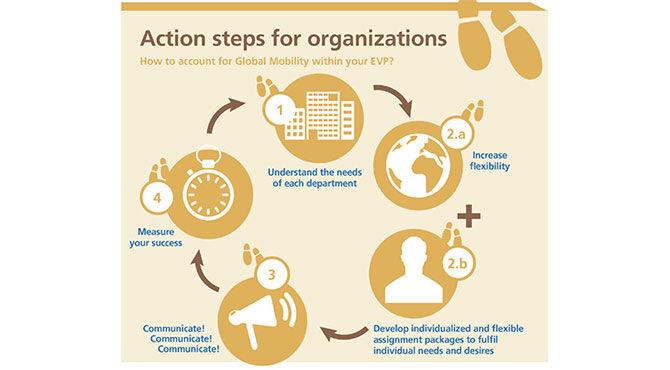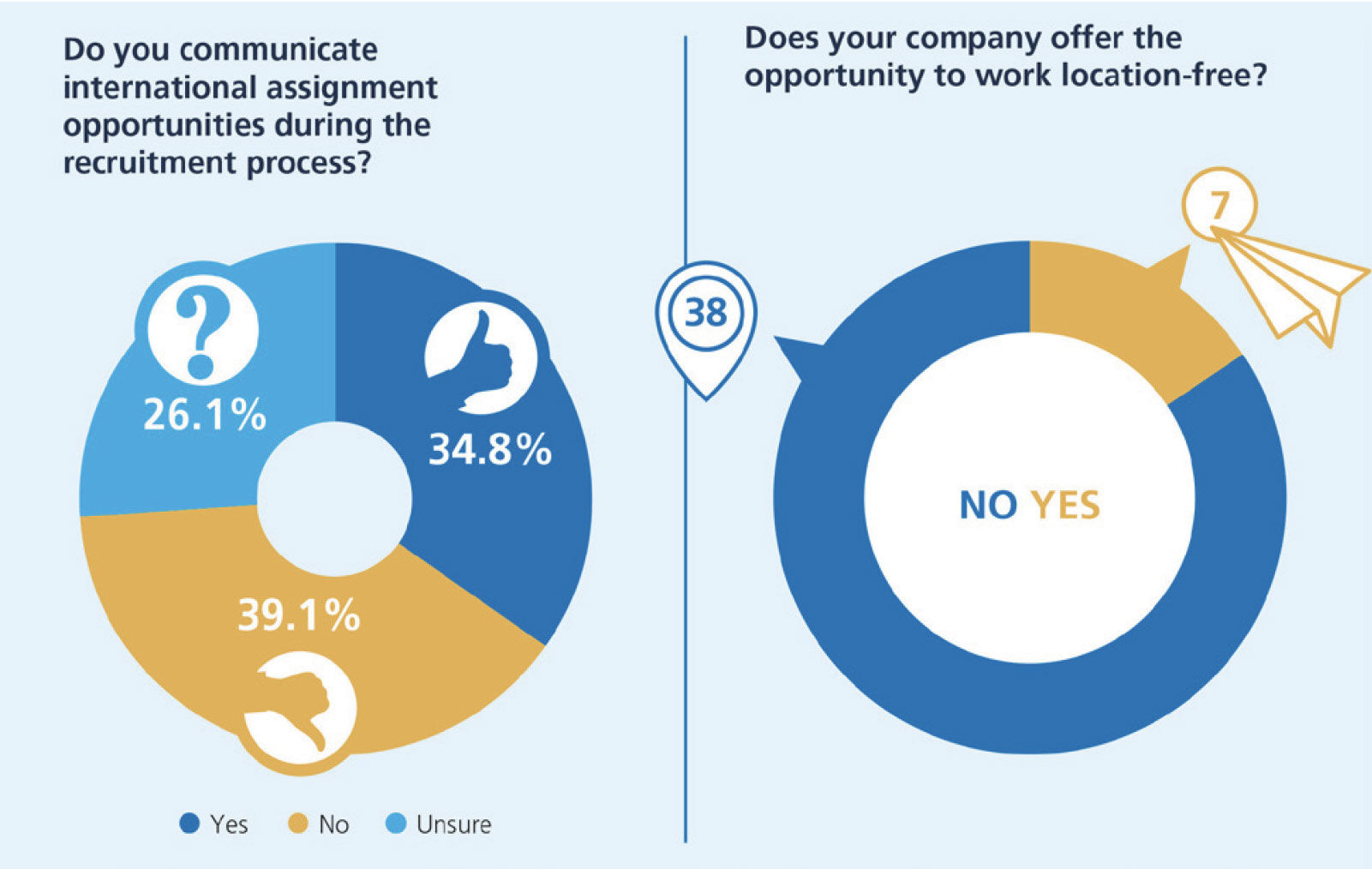The Employee Value Proposition and global mobility: a tool in the war for talent?
The “war on talent” is mostly due to a shortage of skilled labour. How can the Employee Value Proposition help employers attract and retain talent, especially in the world of international assignments and global mobility?

– the must read for HR, global managers and relocation professionals.
Employee Value Proposition (EVP): how can organisations set themselves apart from the competition to attract and retain top talent?
The EVP (also known as also known as an Employer Value Proposition) informs current and potential employees about what they can expect from a company that they (wish to) work for. It conveys the company’s values, what it stands for, and why employees proudly choose to work for it, and it may include such things as an inspiring vision and a unique and distinctive culture. In today’s competitive world, simply offering high salaries and other monetary benefits is not enough to convince employees to choose one organisation over another. Other things such as promising career opportunities, a pleasant work environment and conditions, and a desirable location must, as a minimum, be part of the package as well. Employers must set themselves apart from their competitors in the war for talent and provide compelling reasons for employees to join and remain in the organisation.How do EVP and international assignments provide a competitive advantage for employers?
In today’s globalised world, employees are increasingly searching for opportunities to travel and work internationally with their employers.Companies which successfully communicate the available opportunities within their EVP can earn a competitive advantage in attracting the best talent. HR departments should not be fooled into thinking that this only appeals to the younger generations of Millennials and Gen Z; to get the most out of their careers, older generations of highly skilled employees equally demand these opportunities from their employers. HR departments should consider that this may not be on the mind of an employee at the time of accepting a post, but it may be on their mind in the more medium to long-term and communication about the potential future opportunities may just make all the difference in attracting global talent.It is certain that, over the last decade, the jobs market, at least for skilled and talented employees, has changed dramatically. It is no longer an employer-driven market place where applicants apply and are at the mercy of corporate directors who decide which of the well-qualified graduates who present themselves is given a chance. Today’s globalised world is employee/candidate-driven where great people know their worth and can select from one of the many job offers that they may well have available. With an ageing population leading to even fewer qualified candidates on the market, a compelling EVP becomes critical in enabling employers to beat their competitors in the war for talent and hire high potential candidates. At the same time, having international work experience is almost a pre-requisite for any professional with the desire to climb up the corporate career ladder in internationally focussed organisations.- Join us at Relocate Global's International Networking Reception on Thr 21st Feb at the Institute of Directors in London
- Enter the Think Relocate Awards 2019 to showcase your companies achievements across the mobility sector
RES Forum study: EVP and global mobility
In a recent study, the RES Forum looked into ways in which companies account for global mobility within the Employee Value Proposition. The research demonstrated how companies can use global mobility and international assignments as part of their EVP to create a competitive advantage in order to attract and retain the best employees. As part of the study, the characteristics of the EVPs of 46 major companies were analysed. The authors investigated to what extent global mobility is considered, integrated and actively communicated as part of an EVP.
International work and travel: global employers and HR departments must communicate these opportunities with potential employees
The findings indicate significant room for improvement, showing that whilst most global mobility managers are acutely aware of the importance of including global mobility in the EVP, it only happens in just a handful of the participating organisations.There is no doubt among the RES Forum’s members who participated in the study that a global company must hire talent interested in international work and travel if they want to develop a robust workforce with a global mindset. Yet, few companies actively communicate international working opportunities to potential employees, either because they have no formal communication strategy, or because they do not include global mobility opportunities within their EVP communication. There is a significant discrepancy between the desires and the requirements of mobility departments and the respective corporate strategies of their organisations.If you found this article interesting, you might want to read these related articles:
- Skills investment in employee benefits' spotlight
- CIPD Outlook: MAC plans ‘not enough’ to meet UK skills needs
- I am the one in ten: Firms called to employ more older workers
- Beyond Brexit: CBI puts next generation centre stage
- Why are Generation Z and millennials turning their backs on the biggest employment opportunities?
Whilst it is evident that not every employee in every organisation will be offered the opportunity of international working or an international assignment, organisations can differentiate themselves from their competitors, both in terms of the process and design of their mobility offering, and in the strategy that they use to communicate the opportunities available. This may include communicating everything from the probability of actually being offered an assignment to the purpose and career stage at which an assignment is likely to be offered, (developmental, strategic, technical), as well as repatriation strategies and post-repatriation future career prospects within the organisation. More than 80% of survey respondents in the study are convinced that an EVP has a significant effect on candidates’ choice and more than 60% agree that global mobility offerings are an important differentiator.
How can HR and talent managers determine the right package for the right employee?
It is self-evident that offering the "right” package to the "right” person is essential to attract, recruit and retain the best talent. But what is the "right” package?Factors such as age, culture and lifestyle affect the needs and demands that employees have from their employer and this is no different where international working opportunities are concerned. With respect to global mobility personal drivers, expatriate reward packages and the professional challenge that promotes their careers are most important to early-mid careerists and the Generation Y workforce. Partner or family issues, including dual career considerations, are more important to mid-peak or late careerists. Most companies in the study (55%) generalise their provision and offer a broad-brush, global approach to their EVP, therefore failing to account for local or generational specific approaches. This is almost certainly a lost opportunity and companies should carefully consider whether there is a need to adapt their EVP strategy to meet the needs of diverse employee groups.A principal finding of the study is that the voice of global mobility is not heard with regard to the general corporate strategy design of the EVP. The main recommendation for global mobility professionals then is to make themselves heard! The RES Forum study provides a five-point toolkit with action steps that the mobility team can take to assist the organisation in implementing an EVP that accounts for global mobility opportunities and leverages this as an enabler for attracting and retaining the best talent.The report’s key recommendations are:- Understand the needs of each department
- Increase flexibility in the EVP offered (i.e. adapt it to different groups)
- Develop individualised and flexible assignment packages to fulfil individual needs and desires
- Communicate, communicate, communicate!
- Measure your success
 Access hundreds of global services and suppliers in our Online Directory
Access hundreds of global services and suppliers in our Online Directory
©2026 Re:locate magazine, published by Profile Locations, Spray Hill, Hastings Road, Lamberhurst, Kent TN3 8JB. All rights reserved. This publication (or any part thereof) may not be reproduced in any form without the prior written permission of Profile Locations. Profile Locations accepts no liability for the accuracy of the contents or any opinions expressed herein.



























